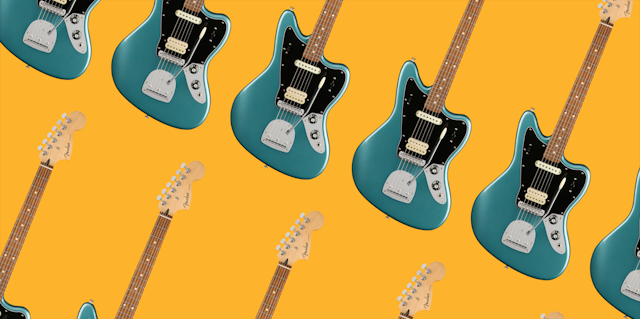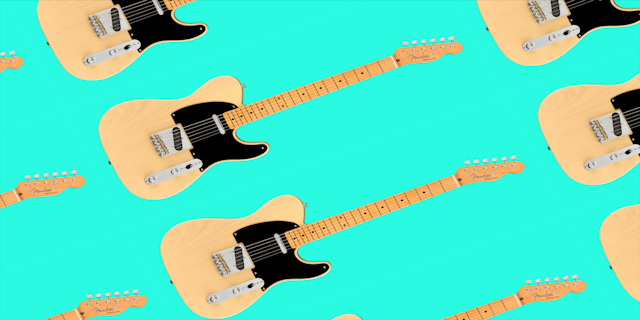
Advertisement

Fender’s online guitar tuition scheme has seen record sign-ups as people seek to learn new skills in lockdown
Fender’s online guitar tuition scheme has seen record sign-ups as people seek to learn new skills in lockdown. But the illustrious brand has learned a few lessons of its own amid a global pandemic – including how to better leverage talent across its social channels.
In April, Johnny Marr gave a virtual guitar lesson on Instagram Live from his home studio. Before strumming the chords to The Smiths’ 1985 tune Headmaster’s Ritual, he held up a recognisable gold guitar and explained: “This is my custom jag – a one-off comet sparkle that they made for me.” “They”, of course, being Fender.
No guitar brand is as synonymous with loud, live music. Just like everyone else, however, Fender has found itself forced to dream up new ways to maintain its relevance in the new normal that lockdown has ushered in for the music industry. Coronavirus benefit gigs, like the recent One World Together At Home, are now held entirely from artists’ houses (or gardens if you are Elton John). Musicians like Gary Barlow have been hosting remote duets over Instagram Stories (you can watch the Take That star’s latest ‘Crooner Session’ with James Blunt here). On the dancehall side, Defected and Glitterbox have been running virtual festivals.
Fender’s chief marketing officer Evan Jones was swift to spot that coronavirus would be a “real leveller of musical expression” and set about exploring ways for the company to weave itself into people’s lives in lockdown, starting with guitar lessons.
Now, he explains to The Drum, lessons gleaned over the past few months will change the brand’s approach to content going forward as huge names from the world of music continue to get involved in its ‘Artist Check-In’ initiative on platforms like YouTube and Instagram.
To support its community during social distancing, Fender moved quickly at the start of April to offer 1 million people around the globe three months of complimentary lessons on Fender Play, its online learning app for guitar, bass and ukulele. The move drew praise from the likes of Led Zepplin’s Jimmy Page and HER, as well as 750,000 new sign-ups (100,000 of which were from the UK).
Jones admits that his team have been “blown away” by the response. “We had over 200 artists that we work with share it on their channels over the first few weeks, which drove a tonne of interest and awareness.”
Though initially intended as a “gesture of goodwill”, the play has undoubtedly boosted the brand’s data pool and CRM capabilities, which it has been steadily building out through the Play platform since 2017.
“We never had a grand plan or master strategy behind [the Fender Play] giveaway,” he asserts. “We just wanted to do our part and provide a little relief. But now, it has given us an opportunity to build an ecosystem for those who are at home or looking to play that will surround them with tools, services and access to Fender that wouldn’t have been possible five years ago.”

When Jones first arrived at Fender in 2015, the guitar marque had been concentrating its marketing efforts on trade and retail – a strategy he has jettisoned in favor of consumer-based storytelling that speaks directly to a wider, digital audience.
Last year, he launched a strategy to get more women involved in the Fender community, which spans some 13 million people on social. Part of this included actively growing its CRM team to establish a more direct relationship with those members. Fender told The Drum last year that, within the first three months, it had added “about 20 people” to the division in Los Angeles, including the new vice-president of CRM, growth and media, Matt Annerino.
Over the past year, the gender split on Play has reached 50-50, he says, showing that this investment is paying off.
The huge surge in people signing up to Fender’s services will undoubtedly result in a sales boost for the company, which offers Play members a special discount on select gear if they choose to continue playing. Though like its bedfellows, Fender is already seeing the impact of Covid-19 on its marketing budgets.
As a result, it’s having to find ways to work around this as it seeks to support not only music fans but also musicians.
“Like every other company out there that’s being affected by the coronavirus when it comes to business, we’re having to manage our spend in line with that dynamic, but at the same time we’re doing our best to maintain our commitment to artists,” Jones explains.
This is chiefly being done through organic content on Instagram, YouTube, Facebook and more. It recently launched ‘Artist Check-Ins’, starring the likes of Marr and The Deftones’ Sergio Vega, to give fans “unique access” to players’ home studios and get an insight into their techniques and tricks. For each artist that creates a check-in, Fender donates to MusiCares’s Grammy-backed Coronavirus Relief Fund to provide support to producers, engineers, singers, songwriters, musicians and more.
It has also been supporting the Uncancelled Music Festival, which has been bringing together musicians, fans and venues from around the globe for a virtual concert experience.
The ad-hoc videos created to promote these propositions has been a far cry from Fender’s usual glossy production methods, but the brand is learning lessons from the process that will serve it well beyond lockdown.
Jones says: “What we’re seeing is an evolution in the type of content that’s being put out there. We still want to invest in rich storytelling when it comes to product launches or artist signature models, but what we’re finding – and I’m sure others are seeing too – is that a great video, shot authentically, can be just as powerful right now.”

Post-lockdown, when gigs restart, pubs reopen and people make the most of a return to freedom, is Jones worried that people are going to put down their guitars and forget about the brand?
“We’ve actually identified that a pretty significant portion of today’s players are what we would describe as ‘self-improvers’. These aren’t people who are necessarily looking to play on stage or write their own music. Instead, what they’re looking for is a release and a hobby, something that they can bring into their lives, do for 30 minutes a day and help them relieve stress or relax.
“That segment is growing not only in size, but also its willingness to buy guitars. So, in some ways, Fender Play is perfectly suited to serve that audience.
“They might not have as many hours as aspiring musicians to play music, with a lot of them have full-time jobs or going to school, but our hope is that we can begin to understand them more better serve their needs. In doing so, we hope to further expand the aperture when it comes to bringing new people into guitar and then also keeping them in over time.”